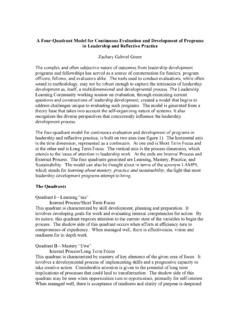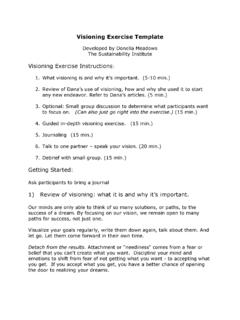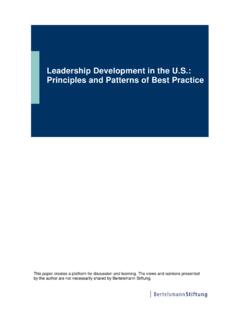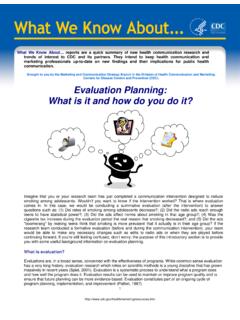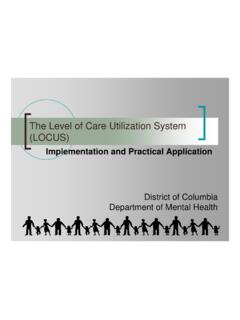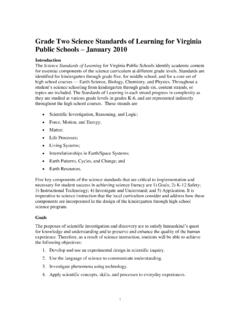Transcription of Leadership Program Outcomes
1 Leadership Program Outcomes Over the past year the Leadership Learning Community has been actively trying to learn more about the Leadership Outcomes that programs are seeking for individuals, organizations, and communities; and the tools and methods programs are using to evaluate these Outcomes . This document reflects and honors some of the important work that the Community has done together so far, and provides a point of departure for continued learning and exploration during the May Conference and beyond. In what follows we share a framework that captures the Leadership Outcomes that programs have most consistently articulated as well as some of the methods that have been used to evaluate these Outcomes . The purpose of this work is to become clearer about what we are trying to achieve with our programs so that we can be more intentional about how we plan and deliver our programs , and more capable of assessing what we are achieving both in the short term and over time.
2 Categories of Leadership Outcomes There are four broad categories of Leadership Outcomes programs are seeking to promote: Core Leadership Competencies Personal Transformation and Mastery Organizational Leadership Capacity Community Leadership Capacity Short and Long-Term Outcomes The range of Outcomes extends from the inner work of transformation to the outer work of organizational and community capacity building. The process of achieving these Outcomes begins while leaders are participating in a Program and it develops and deepens over time. Thus the full impact of our programs cannot be known in the short-term. One of the challenges and opportunities we have as a Community is to develop projects, approaches, and tools that will enable us to capture change and transformation over time.
3 One approach may be to specify stages of growth and development that become benchmarks for us to assess how individuals, organizations, and communities are nurturing and deepening their Leadership capacity over time. If we have a theory about how change and transformation happen then in our evaluations we can begin to document where individuals, organizations, and communities are along a continuum of Leadership development and change . Possible Next Steps There are many possibilities for how this work may continue and we urge you to be creative in your thinking about how to improve our ability as a Community to learn from and better understand the impact of our programs . Some possibilities may include: Further refining/elaborating questions/indicators in a selected category Discussing what you would look for to demonstrate an outcome Considering whether there are important Outcomes that are not captured here Sharing your experiences and tools with evaluating any of these Outcomes (both your successes and failures/challenges) Thinking strategically about how we as a Community can work together to develop and implement more powerful evaluation tools Core Leadership Competencies Communication (Is the leader able to articulate and convey a problem?)
4 Motivate action? Broaden and deepen the understandings others have of issues affecting their communities? Is the leader capable of influencing the shape of public discourse and debate? Effective at using the media to convey a message? Able to use technology to increase access to and disseminate information? Does the leader express her point of view without rancor?) Collaboration and Democratic Process (Is the leader capable of cooperating/collaborating with others? Is the leader able to negotiate conflicts fairly?) Critical Social Analysis (Does the leader have the capacity to be critical of the status quo? Is the leader capable of understanding the root cause of a problem? Does the leader raise new questions? Does the leader understand how her work fits into a larger movement for change ?
5 Systems Thinking (Does the leader have the ability to see how individual situations are shaped by a broader context? Does the leader have a theoretical framework for understanding social problems? Does the leader understand the fit between theory and practice?) Leadership Development (Is the leader willing and able to share his learning with others? Does the leader actively cultivate the Leadership of others, especially young people? Does the leader foster increased self-awareness in others?) Cultural Competence (Is the leader aware of his own culture and how it shapes his behavior and perspectives; and how others may respond to him? Is the leader able to understand and respect other cultures? Does the leader recognize that diverse perspectives strengthen the dialogue and approaches to solving social problems?)
6 Is the leader aware of how power and diversity affects relationships? Is the leader able to build relationships across boundaries?) Methods that programs have used for assessing Core Leadership Competencies Self-reporting on skill acquisition through interviews, surveys, and internal reporting systems External assessments through interviews with placement/internship sponsors, feedback from employers, and input from faculty and trainers Personal Transformation and Mastery Self-Reflection and Awareness (Does the leader use reflection to clarify his values and vision? Is the leader aware of her strengths and weaknesses as a leader? Is the leader aware of his own Leadership style and how that style may differ from others? Is the leader able to critically examine her role in organizations and communities?
7 Spirituality and Inner Work (Does the leader take time for reflection and spiritual renewal? Does the leader value and engage in improving herself? Is the leader aware of and committed to overcoming her fears? Does the leader demonstrate a balance between being and doing? Does the leader have a sustained commitment and willingness to work for the good of others even though results may not be realized in their lifetime? Is the leader capable of aligning her values with her work?) Reflection and Learning (Does the leader take time for reflection and learning? Is the leader open to receiving feedback about how to improve from others? Does the leader have a thirst for new knowledge? Is the leader capable of learning from failure?)
8 Does the leader look for and create learning opportunities?) Courage and Ethical Action (Is the leader capable of taking risks? Is the leader willing to try new things and experiment with ideas? Does the leader act ethically? Does he demonstrate courage? Is the leader trustworthy? ) Authenticity (Is the leader capable of acting in accordance with her visions and values? Is the leader able to lead with compassion? Does the leader call forth the best from himself and others? Are the leader s values transparent to others through her work?) Methods that programs have used to assess Personal Transformation and Mastery Personal anecdotes Fellow reflections and assessments Vehicles for these assessments included storytelling, interviews, survey instruments, written testimonials, personal letter or journal reflections, and required reports.
9 Organizational Leadership Capacity Leadership /Governance (Does the organization have strong Leadership , staff and volunteer? Is the organization s Leadership diverse? Is the Leadership responsive to the community s needs? Does the organization s Leadership promote empowerment?) Program Planning and Implementation (Is the organization providing programs that meet community needs? Is the community engaged in setting organizational priorities? Are there opportunities for constituent/client involvement in identifying problems; and developing and implementing solutions? Are services culturally appropriate?) Learning (Does the organization evaluate its programs using criteria it has defined? Is the organization able to learn from its evaluation work?)
10 Does the organization take time to reflect on what it is learning in the course of its work? Does the organization learn from its mistakes? Is there an environment of trust that enables learning to take place? Does the organization disseminate what it is learning to others in the community?) Sustainability (Is the organization capable of generating the financial resources it needs to support its programs ? Does it have a strategy for developing Leadership ? For transitioning Leadership ? Does the organization pay attention to spiritual renewal?) Connections/Networking/Partnerships (Does the organization initiate partnerships with other organizations in the community? Leverage existing partnerships? Does the organization have connections with policymakers?
